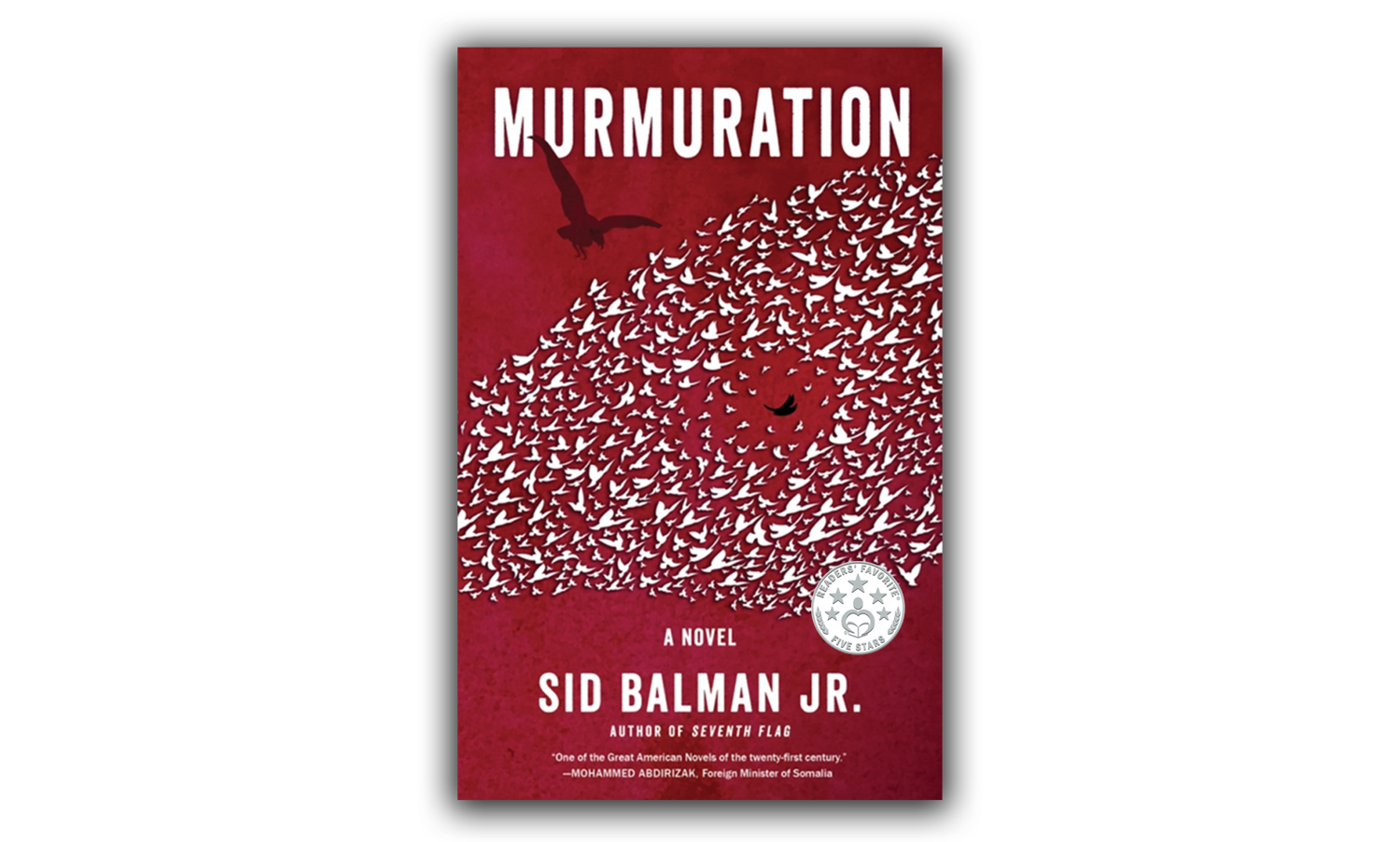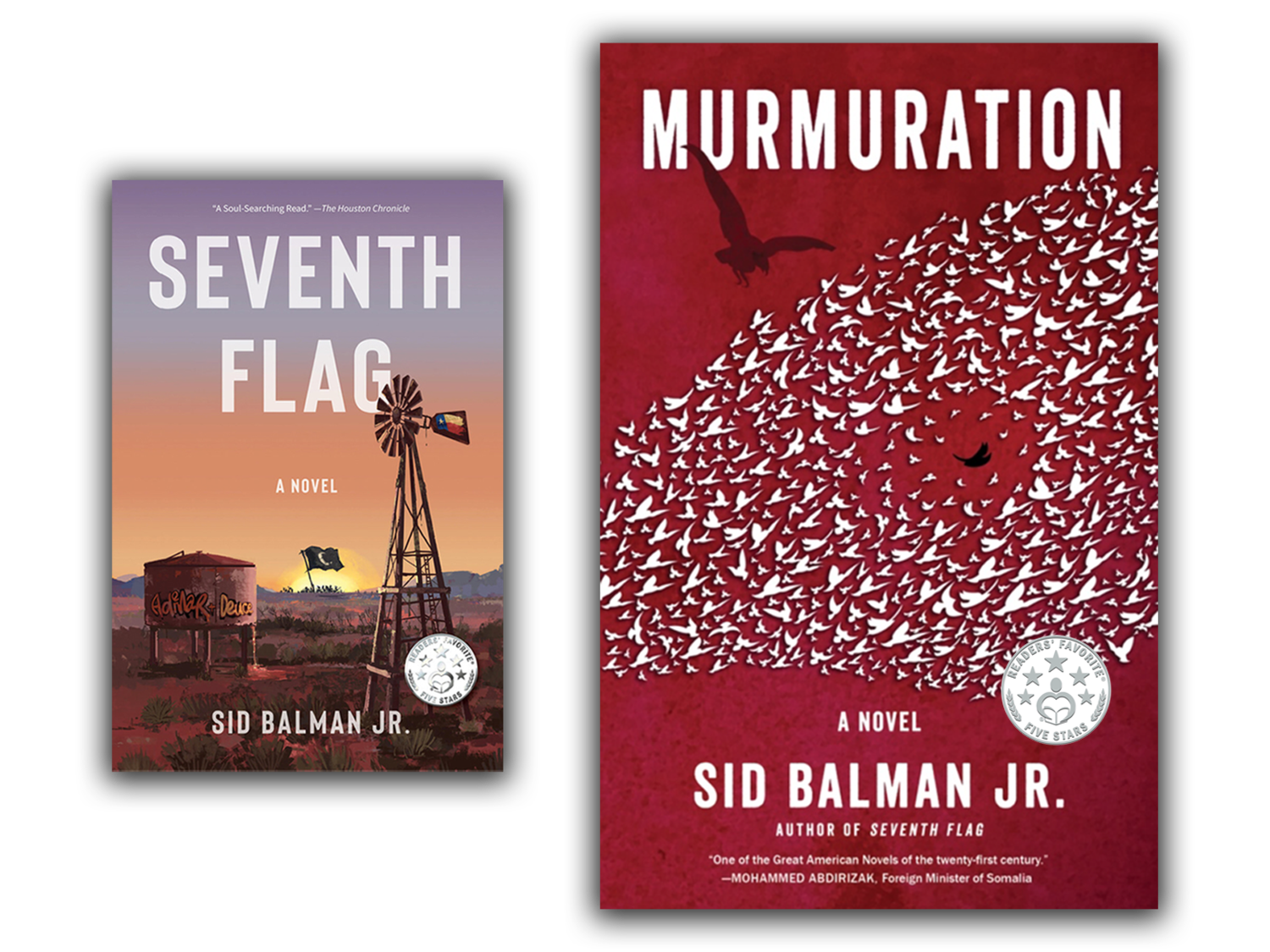Radicalism, white supremacy take center stage in Pulitzer nominee’s new novel, ‘Murmuration’
Charlie Christmas, Ademar Zarkan and Prometheus Stone are the best of America, united by war, scarred by displacement and resolute in the face of the troubles that rip the nation apart over three decades. Christmas, the Somali translator with a split personality and Zarkan, a Syrian Muslim woman raised in West Texas, a West Point graduate and a US Army sniper who struggles to reconcile her roles as an assassin and a mother; are brought together by Stone, a lapsed Jew and an Army captain amid a war and famine in East Africa the likes of which the world has rarely seen.
Their journey from the mean streets of Mogadishu to the high desert of West Texas, the barren plains of Indian country and the rolling hills of Minnesota is both tragic and uplifting. Charlie’s son, Amiir, is the bookmark in their lives, and the struggle to raise him amid the predators of white supremacy and violent radicalism is their life’s work. With the help of Buck, the bomb-sniffing dog with a nose for danger, they prevail over Somali militias, pirates, white supremacists and ISIS terrorists in a splintering world that has turned on itself like a serpent in the singularly obscene act of devouring its own tail.
Murmuration digs deeper into the backstory from some of the beloved West Texas characters in Balman’s awarded debut novel, “Seventh Flag,” and defines what it means to be American in the 21st Century.
“Mr. Balman has written what I consider one of the Great American Novels of the 21st Century. In Murmuration, the second novel in the Seventh Flag trilogy, he has turned on its head the traditional notions of heroism, patriotism, loyalty and gender. Balman weaves three decades of experience with conflict and extremism into a heartbreaking tale of diaspora and displacement that has defined the saga of so many migrants to the United States. As one who has made that journey, I urge all my countrymen and women – whether Somali or American – to read Murmuration.”
—Mohamed Abdirizak, Foreign Minister of Somalia
“The book we should all be reading right now! Murmuration is a work of absorbing historical detail but also a multi layered story of love, honor, loss and the plague of radicalism. Sid Balman Jr. carries us from West Texas, into the battleground of Mogadishu and refugee camps in Kenya to suburban Minnesota giving us a deeper understanding of our global struggle with radicalism. Nothing is ever what it seems.”
—Donatella Lorch, award-winning war correspondent for the New York Times, Newsweek and NBC News
“When a young Somali immigrant is confronted by hatred, it’s no surprise that he will rebel against the society that rejects him. Murmurationis a fast-paced thriller that captures the horror of the Somali refugee crisis and brings that horror home to America. It is a story of fear, revenge, compassion, and, ultimately redemption. Sid Balman, Jr. writes about the global threat of ISIS and white supremacy with the confidence and authority of someone who has witnessed it firsthand. This novel is a compelling glimpse into a dangerous world.”
—Clifford Garstang, author of What the Zhang Boys Know and The Shaman of Turtle Valley
“Drawing on his personal experience in conflict, Mr. Balman immerses the reader in the purgatory of an African refugee camp, the snap of a passing bullet, the horror of a deadly crocodile strike, and the satisfaction of a sniper's kill shot. He chronicles the turmoil in the head of a young Somali lured by unexpected sexual access, the calls to violence from an Imam preaching nihilism, and the torments inflicted by white nationalists inside American prisons. More than a good read, the novel presents the back story to today's headlines.”
—US Ambassador to Somalia James Bishop (Ret.)
Q&A with Author of Murmuration, Sid Balman Jr.
Before we dive into “Murmuration,” can you give us some background on your debut novel, “Seventh Flag,” and how it ties into the storyline and characters in your new book? Do people need to read “Seventh Flag” before cracking open “Murmuration?”
“Seventh Flag” is historical fiction examining the radicalization of America from World War II to the present day, with a brief foray into the administration of President Franklin Pierce prior to the Civil War and how his initiative to import camels from the Middle East for the U.S. Cavalry led to Texas having the nation’s largest Muslim population. The “Seventh Flag” trilogy centers on two families in West Texas as they engage in iconic, universal American activities that bind us together. One does not have to read “Seventh Flag” to fully enjoy and understand Murmuration, although I would certainly recommend it. The final novel in the trilogy, “Last Gun,” takes the readers 30 years into the future, with the same characters and geographies, to a dystopian, post-Trump nation splintered into warring fiefdoms.
Tell us about the title of “Murmuration.” What does it symbolize?
Massive, billowing flocks of starlings murmurate as a way to protect themselves from predatory birds, offering safety to the group, while conceding some fatal attacks. It is a metaphor, explained in the book as the central characters drive through the Great Plains and encounter a murmuration just prior to a deadly encounter with white supremacists, for how migrant communities coalesce against threats in their new homes.
How did you incorporate your personal experiences working as a journalist covering international politics and national security in Somalia into your new novel?
I flew into Somalia on an Air Force C-141with a planeload of locked and loaded Marines deployed as the vanguard to ensure humanitarian relief against marauding warlords amid famine and war. I was the vanguard for one of the world’s largest news agencies, with $50,000 and orders to set up our coverage for what would evolve into a complex, bloody war that defined Clinton Administration national security strategy in the post-Cold War world. My staff and I, utilizing American relief flights, reported from one end of the vast nation to the other embedded with U.S. forces, and witnessed firsthand the botched raid in Mogadishu depicted in Ridley Scott’s powerful film “Black Hawk Down.”
Minnesota is home to the largest Somali community in the U.S. How did that come to be?
After leaving daily journalism, I developed a specialty in behavior-change communications, focused primarily on countering violent extremism on behalf of the U.S. and other governments. Drawing on my experiences and contacts, we developed a project for the Department of Homeland Security to mitigate ISIS recruiting and white fascism in Minnesota, the largest concentration of Somalis in the U.S. due primarily to resettlement practices that place migrants in regions with low unemployment, appropriate jobs and a supposedly progressive populace. Much of “Murmuration” takes place in Minnesota and draws on my experience with that project.
Are any of the characters in “Murmuration” based on real people?
Generally speaking, all of the characters are mosaics of real people. But the fictional Laws family in the tiny West Texas town of Dell City is based on a colorful clan that helped build a farming empire on the high desert. One of the daughters was a founding member of the Dixie Chicks band! The real family, starting with Jack Lynch, were incredibly helpful and generous with my research.
What thematic roles do violent radicalism and white supremacy play in your new book?
Violent radicalism and white supremacy in my view and work are public health issues, spreading virally like a disease and requiring the same mitigation strategies as any illness. My main characters – black Somali migrants, a Jewish Army officer who becomes a rabbi, and a groundbreaking Muslim woman – a West Point graduate and Army sniper who struggles to reconcile her life as an assassin and mother – epitomize those who face and can fall prey to violent extremism due to injustice and marginalization. Without spoilers, each of these characters face the ultimate dilemma in the face of those challenges, whether to fall prey to violent radicalism or to hold the line against it.
How do you explore gender and gender roles in “Murmuration?”
Ademar Zarkan, my favorite character, is the vessel for all those themes. Ademar, raised in West Texas, breaks all the glass ceilings of gender and faith as she plays football, maintains a deeply personal and sexual relationship with a white, Christian boyhood companion, graduates from West Point, serves as a deadly sniper in the Army and has children. When asked in “Murmuration” why she is a sniper, Ademar cites Virginia Woolf’s book, “A Room of One’s Own,” to explain how being a sniper is her room, a place where she is safe and calls all the shots, both literally and figuratively.
What other themes are found in “Murmuration?
Whew; that’s enough! The rest are all variants, but police brutality in Minnesota rears its head in a profound way in the wake of the murder of George Floyd. I spent several months researching in Minnesota prior to the Floyd incident and found disturbing pockets there of white supremacy among law enforcement. That’s why I was not at all surprised when the FBI discovered that many of the rioters who stormed the U.S. Capitol on Jan. 6 came from law enforcement and the military. Classically radicalized individuals.
Some novelists plan out all the details in a series before they even finish the first book. Others write as they go. What was your approach?
I’m very meticulous about mapping out the book before I write a single word. I spend months on research, construct detailed character profiles, outline every chapter and even build story boards that incorporate images and maps. As a former wire service reporter – a classic ink-stained wretch – I write very fast once I start, being careful not to write and edit at the same time. That said, and one of the most interesting aspects of my process, is not being too fixed on my story process and allowing the characters and narrative to grow organically within the tale. For me, it’s really a lot of fun!
You’ve now written nonfiction journalistic works as well as fiction. Do you prefer one over the other? What are the unique challenges of each?
I’m asked this frequently. Fiction is journalism, I just get to make up the story and all the quotes. In all seriousness, I’m an old-school reporter who believes that journalism must be the most accurate representation of the truth as one perceives it based on a moment in time. My fiction is a metaphor for the truth perceived through the rear-view mirror.
How important is your Texas background to your identity as a writer?
I’m a fourth-generation Texan, and the best of that amazing state is in my DNA. Iconic activities that draw us together as Americans abound in Texas, which made it the ideal place to start spinning this trilogy. Expressing the unity of America and Americans in my view is the antidote for what’s currently ripping us apart, and that, even more than my background, is why Texas is a dominant setting in the trilogy.
Without giving too much away, what is in store for the final novel in his saga?
It’s dystopian, not science fiction, set in an America of fiefdoms with no modern utility infrastructure and culminating in a battle for dominance. Not surprising, Ademar, a woman well into her 70s, and all the characters from the first two novels, rule over the last pocket of Free America based, where else, in West Texas.



